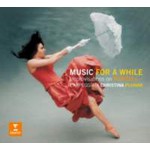
Music for a While: Improvisations on Purcell
 $30.00
Special Order
$30.00
Special Order3 - 6 weeks add to cart
HENRY PURCELL
Music for a While: Improvisations on Purcell
Philippe Jaroussky, Raquel Andueza, Vincenzo Capezzuto, Dominique Visse, Trovesi, Muthspiel / L'Arpeggiata, Christina Pluhar
[ Warner Classics / CD ]
Release Date: Sunday 26 October 2014
This item is only available to us via Special Order. We should be able to get it to you in 3 - 6 weeks from when you order it.
After the intoxicating heat of Mediterraneo, released in 2013, Christina Pluhar and her ensemble L'Arpeggiata - again in the company of countertenor Philippe Jaroussky, soprano Raquel Andueza and alto singer Vincenzo Capezzuto - now head to the cooler climes of England with Music for a while, an album based on the haunting, graceful and sometimes deeply moving music of Henry Purcell.
Often considered England's greatest composer, Purcell (1659-1695) represents an especially good match for the aesthetic of L'Arpeggiata: he made frequent use of the ground bass, a repeated (ostinato) figure in the lower line - the most famous instance of this occurs in Dido's lament 'When I am laid in earth', the closing number from his opera Dido and Aeneas. The ground bass provides an ideal foundation for the brilliant, sometimes jazz-like improvisation that is the stock-in-trade of the L'Arpeggiata, here comprising singers, (plucked) strings, wind instruments, keyboard and percussion.
As the New York Times has written: "Just as the composers and ensembles that ply the indie path in new music combine structures and language from contemporary classical styles with gestures and timbres from pop and world music, L'Arpeggiata has lately been hopping through cultures and across centuries. The group uses modern pop vocal inflections and improvisational techniques from jazz in its performances of antique pieces ... Its audacious hybrids are driven principally by a fascination with reviving the Baroque art of ornamental extemporization and a curiosity about how contemporary improvisatory styles might be enlisted in that quest." When L'Arpeggiata appeared at Carnegie Hall's Zankel auditorium in 2012, the newspaper reported that: "Here a lean septet combined precision and poise with the intuitive flexibility of a jazz combo."
The contemporary element in Music for a while (named after a song written for John Dryden's play Oedipus) is exemplified by the contribution, on acoustic and electric guitar, of Austrian jazz-player Wolfgang Muthspiel, while the Baroque tradition is embodied in the celebrated French countertenor Dominique Visse, a singer who set an example for Philippe Jaroussky; Visse was a student of the pioneering British countertenor Alfred Deller (1912-1979), closely associated with the music of Purcell and the revival of interest in Baroque music.
In the course of 2014, Music for a while will be presented at concerts in Rome, Paris, Grenoble, Berlin, Ludwigsburg and London. When the Mediteraneo programme was presented in London in 2013, The Arts Desk reported that: "Perhaps the best bits of any L'Arpeggiata concert are the improvisations. Laying down a ground bass (a riff by any other name) the group then take it in turns to step forward for jazz-style breaks. Jazz might have come down to us via Africa but I defy anyone to hear a Purcell or Monteverdi ground and not trace the natural genealogy. Pluhar here makes her case without effort as we marvel at plucked bass and drums or - most impressive - a percussion solo for the finest wizard of percussion David Mayoral, giving us a single skin that can shriek, cry or sing according to the strokings of his fingers."
In Germany, the Potsdamer Neueste Nachrichten described a concert given by L'Arpeggiata with Philippe Jaroussky as "a rare two-hour feast of music-making. For years, exulting in sound, [Christina Pluhar and L'Arpeggiata] have been demonstrating in the most persuasive way how fresh and timeless 'old' music can sound. Pluhar recognises no borders, no divisions between eras. For her, it is all music."
"Long experienced in fusing Baroque with jazz-inspired performance styles, L'Arpeggiata's approach breathes new life into the Restoration composer, whose ground basses are akin to riffs, his melodies folk-like in their raw simplicity...Baroque instruments and a jazz-style combo mix to intriguing effect" (BBC Music Five Stars)
"most of these songs retain their essential character, and far from having his genius dimmed, Purcell still shines as a writer of songs timelessly receptive to reinterpretation and capable of reaching the heart by the power of melody alone." (Gramophone)
Tracks:
Purcell:
Twas within a furlong of Edinburgh Town (from The Mock Marriage, Z605)
Music for a while, Z583
Strike the Viol (from Come Ye Sons of Art, Z323)
An Evening Hymn 'Now that the sun hath veiled his light', Z193
In vain the am'rous flute (from Hail, Bright Cecilia!, Z328)
A Prince of glorious race, from Who can from joy refrain?
O solitude, my sweetest choice, Z406
When I am laid in earth (from Dido and Aeneas)
Wondrous machine
Here the deities approve, Z339
Ah ! Belinda
Hark how the songsters of the grove (from Timon of Athens, Z632)
One charming night (from The Fairy Queen, Z629)
Man that is born of a woman, Z27
Plainte - O, Let Me Weep (from The Fairy Queen, Z629)
Curtain Tune from Timon of Athens Z632
Music for a while, Z583
bonus track
Cohen, L: Hallelujah



